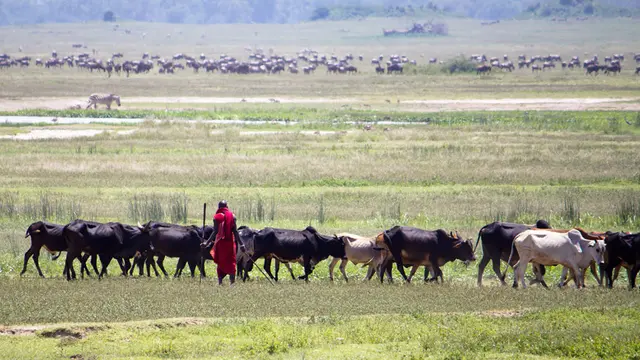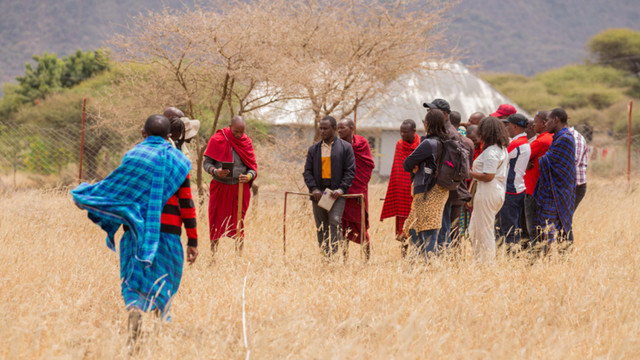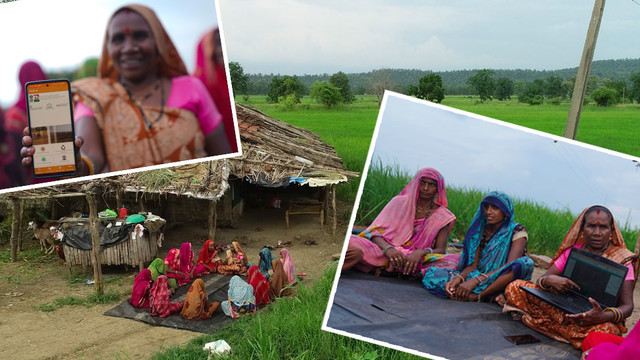Europe needs transformational adaptation: lessons from the frontline
Europe is now the fastest-warming continent and is already struggling with the impacts of climate change. We look at how the experience from countries at the frontline of climate action is shaping their response, and the role of IIED Europe and IIED in connecting people with possible solutions


The panel at the ECCA 2023 side event discusses how insights from community-based adaptation around the world can support European regions and communities in their transition towards climate resilience (Photo: Alexandre Fernandes/IIED Europe)
The evidence is clear. According to Copernicus, the European Union’s (EU’s) climate observatory, July 2023 was the hottest month on record. Summer 2023 has been marked by a series of extreme weather events in Europe, including heatwaves, wildfires and floods.
Extreme weather and climate-related events are taking a heavy human, economic and environmental toll in Europe, with most impacts and risks (PDF) expected to become more severe in a warmer world.
Despite this ‘new normal’, Europe remains largely unprepared for the impacts of climate change. The unprecedented scale and speed of change calls for a transformational approach to climate adaptation. And to be truly transformational, adaptation will need institutional reforms that facilitate multi-sectoral, ‘whole-of-society’ decision making.
Adaptation will also need to address the structural inequalities in society at the heart of continuing vulnerability to climate risks. The Intergovernmental Panel on Climate Change (IPCC) calls for transformational adaptation (PDF), but what does this mean for Europe and what can be learnt from pioneers beyond its boundaries?
Sharing common challenges, learning from each other
‘Forging a climate-resilient Europe – the new EU Strategy on Adaptation to Climate Change’, adopted in 2021, sets out how EU countries can adapt to the unavoidable impacts of climate change and become climate resilient by 2050. The strategy calls for more systemic adaptation, by supporting the development and implementation of adaptation strategies and plans at all levels of governance and across many different sectors.
It also recognises that: "The EU can also learn from others: many of our international partners have long been on the frontlines of climate change and have valuable experience that can help Europe become more climate resilient".
In this context, bringing these experiences and insights from climate adaptation practitioners from around the world to European actors can inform and drive ambition for a climate-resilient Europe.
This message was echoed during the EU’s second Forum of the Mission adaptation to climate change. For European regions and communities, sharing experiences and learning from each other – including from regions outside Europe who have developed robust and innovative climate adaptation solutions – is crucial to support their transformational journey towards climate resilience.
Bridging the knowledge gap
IIED Europe and IIED have been creating spaces and promoting dialogues between regions and communities in Europe and in the Majority World, where they can learn from each other, share similar challenges and propose ways to overcome the barriers to climate adaptation.
Two recent examples include the side events:
- ‘Forging a climate-resilient Europe: learning from community-based adaptation practitioners outside Europe’ at the 6th European Climate Change Adaptation Conference (ECCA 2023)
- ‘Delivering LLA: lessons from the frontline of climate action’ at the London Climate Action Week 2023.
These events built on ongoing dialogues and learning on climate action between countries in the global South – from the Gobeshona Global Conference in Bangladesh, to the annual conference on community-based adaptation to climate change, this year held in Bangkok.
Participants identified some of the adaptation challenges faced by communities and shared locally-led adaptation (LLA) key messages, and insights to inspire, inform and drive European climate ambition.
The key messages included:
- The crucial need to endorse and apply all eight principles for LLA to empower local stakeholders in adapting to climate change
- Trusting in and truly giving a voice to local organisations is key – creating the enabling conditions for this to happen should be a priority
- There are ongoing hurdles and barriers to accessing climate finance – overcoming these is increasingly important, and
- Many nature-based solutions (NbS) are too simplistic – there is a need to integrate NbS into adaptation planning processes.
What’s next?
Regional and local communities are best placed to drive and implement transformative climate adaptation in Europe. The EU-funded project Pathways2Resilience (P2R), in which IIED Europe is a partner, provides an excellent opportunity to do so.
P2R aims to support 100 regions in their transformative journey towards climate resilience. IIED Europe is leading the monitoring, evaluation and learning component of this project and will explore opportunities to integrate the key messages above in this work.
Considering that more than 100 organisations (including various European governments) have endorsed the principles for LLA, these can serve as a useful set of criteria to ensure that European communities are empowered to lead sustainable and effective adaptation to climate change at the local level.
With thanks to Helen O’Connor and Sam Greene for their contributions to this blog.


